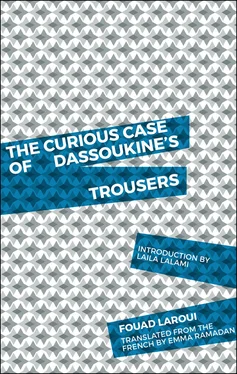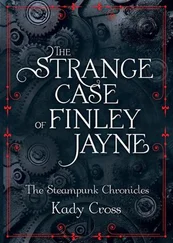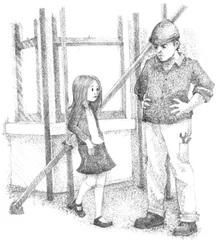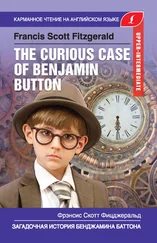…and that it was out of the question, consequently, to import anything of his own customs, habits, behaviors from his native Morocco…
…what did he know of them, anyway?
…into this country where he was rebuilding his life — no: where he was continuing his life — Anna whom he had ended up marrying in order to settle down (isn’t that what it was called, in times past, in the world of Parisian courtesans? (Doesn’t Proust use this expression somewhere? Concerning Odette, perhaps?)…
… it had been years since he had last read Proust. He no longer had the opportunity to use him. Or to share him. Simenon, sometimes, not even… the newspaper…the sports pages…the television…
— Oh Maati, you and your French references …and sometimes she would add, with a smile: You aren’t even French, you’re Moroccan!
That sounds like a reproach. At the corner of Transvaalstraat, where a hundred absolutely identical houses trace converging lines toward the void, everything seems like an accusation that the court clerk, one foresees, will end up summarizing with the following question asked in a glacial tone: “What are you doing here?”
(It wasn’t mean, just a bit teasing — Anna didn’t establish any hierarchy between Moroccans and the French…)
… nor between the Chinese and the Peruvians, nor between anyone and anybody, like a good little Protestant…
…which stunned him, and for which he was extremely grateful to her—
…up until this instant, this dislocation, Transvaalstraat; he didn’t recognize gratitude for anything anymore, he didn’t recognize anything anymore; he would have preferred that she treat him like a Chinese person rather than say to him: “You are other, but that’s okay, we forgive you, and you’re equal to all the others”—just as at the zoo, the tiger seems to be the equal of the porcupine, they are fed in the same way, they are loved the same and the placard in front of the enclosure, which designates them very scientifically, which situates them (there is a map of the world and a red spot to mark the territory where they toil away), so, what about the placard? It’s the same for all: tiger, porcupine, or bonobo — but Anna, you’re outside of the enclosure, it’s your father, younger, beard less white, who points at the bonobo and reads aloud for you the description provided on the placard…
… it was so new, a country where he was just as well regarded, or just as poorly regarded [depending on the person], as the French. At least there’s that in exile.) He had tried one day to explain to her that he was Moroccan by birth, in body, but “French in the head.”…
…what does that mean, exactly? It’s absurd…it’s tiresome…my God, everything is escaping me…It’s my mind, fittingly, that’s liquefying—“France, your coffee is escaping!”—and what will remain, what remains of our loves, if our mind goes to the dogs, nothing but a body, a big sick body, on its back, bigger dead than alive…
(Suddenly he remembered the title of the novel-essay by Günter Grass, Headbirths or, the Germans are Dying Out. Today he could read it in German: Kopfgeburten oder die Deutschen sterben aus…
…a lot of good it does you! A lot of good it does me! Who is speaking? Who is shouting at me? Who are these snakes…
While learning Dutch, he had incidentally also learned German. At least there’s that, in exile ( bis ). I’m cold, he said to himself sometimes with bitter irony, I’m cold and I eat tasteless things, but at least I’ve learned German, the language of the philosophers, and now I know the exact meaning of aufheben. We were really impressed by them, the Althussers and the consorts, the Derridas, the Glucksmanns, in Paris, when they threw out words like that one, without translating them, as if they were using an abracadabra only they could access.)
If they were here, on this street, I would throw a big stone at their heads, a rock I would first need to lift up, aufheben— but then who, but then what is it in me that enjoys making such bad bilingual puns? Who-then-what-then forces my mouth into a sneer — come on, it’s not that funny! — when I’m in the middle of dislocating myself, on the corner of this street…
She had laughed in his face, and even he wasn’t very convinced by his pro domo plea. (He got angry when Anna contradicted him, and even more so when he knew that she was right, at least partially — but he never let it show, true to his credo: “I am not at home here, I am a sort of guest in this country.”)
…as if one were never at home… a little speck of dust in an unlimited universe. The eternal silence of these infinite spaces frightens me… Or is it “the infinite silence of these eternal spaces frightens me”? And if some people believe they are at home, in this tiny particle of dust, in a tiny corner of a speck, and others are invited here…
But here, for God’s sake! Here, in Utrecht, wasn’t he ten times more of a foreigner than he would have been if he had moved to Nantes or Montpellier? Over there, the trees would have had familiar names, the trees and the animals and the household items at the supermarket; over there, he wouldn’t have needed to consult a dictionary to buy a mop — a mop , goddamnit! It had come to this, he who had dreamed of “changing the world”—what was it again, that Marx quotation he had repeated with elation (in his youth, for now opportunities for citing Marx were rare — at university, he had seen people defend a thesis in economics, in sociology, without being able to define surplus value or the tendency of the rate of profit to fall)…
…but s…! All that’s finished, it’s history…What use is it to you now, here? All of Marx in the Pléaide…One day, someone will throw it in a dumpster, not understanding anything (“It’s French”)…Very distinctly, he sees the scene and is submerged in a wave of infinite sadness. Young men, grinning, talking about soccer, throwing his Pléaides one by one into a dumpster full of trash and these millions of words, these millions of dead birds, will rot in a corner of polder.
… with a sort of pride by anticipation — like a program, like a project…ah yes: “Philosophers have only interpreted the world; the point is to change it!”
He mutters, tears in his eyes: Die Philosophen haben die Welt nur verschieden interpretiert; es kömmt drauf an, sie zu verändern. It finishes as a sob: verändern! Take note, Deus absconditus: one winter night, Transvaalstraat, in a little town in Holland, a Moroccan in complete dislocation, quoted out loud, in German, the eleventh thesis on Feuerbach. Not a blade of grass trembled, not a mouse stirred. (When an oak tree falls in the middle of the forest, does it make a sound? He finally has the answer, but it’s too late.)
He added long ago, a bit of a pedant, but a winning pedant: “the eleventh thesis on Feuerbach,” yes, yes: “the point is to change it!” But today? Life’s vicissitudes…
Let’s accuse life, it won’t defend itself. Life’s a bitch, but at least it shuts up. (Oh…but you’re not really going to reproach sweet, kind Anna for her babbling — isn’t that what you used to find the most charming about her — that incessant chirping — when she had nothing to say, she hummed…Yes, what charms in the first days, the first months, can perfectly well become a reason to murder ten years later…)
Here he is, an immigrant in a world where he doesn’t know the codes, or only very vaguely, a world where each day he must discover the codes — a discreet nudge from Anna, the nudge in his side…
Читать дальше












